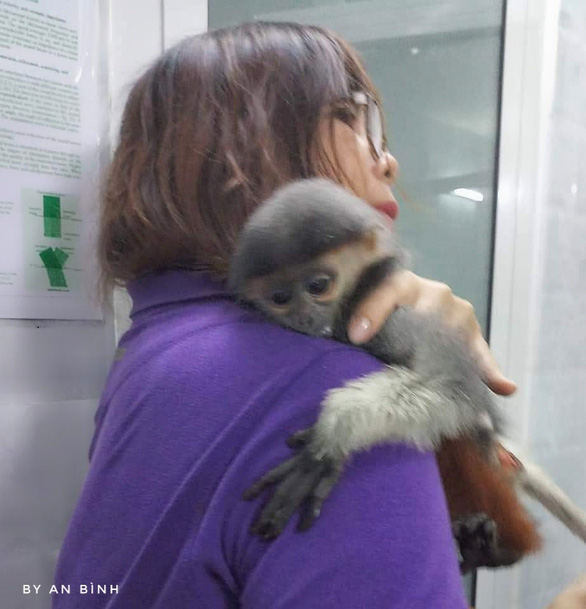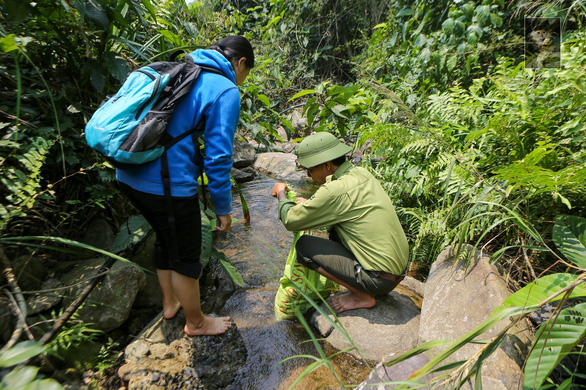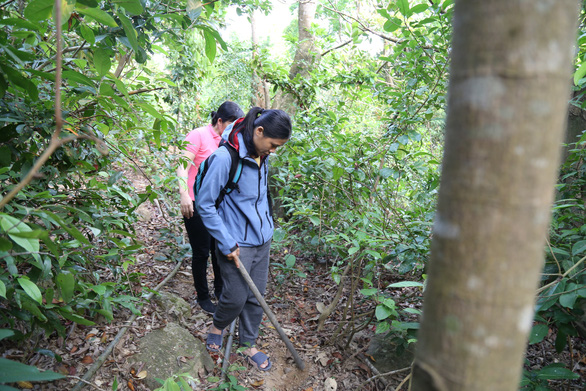The two amateur conservationists are saviors of wounded wild animals on the peninsula.
It was twilight when the hotline of the Son Tra Wildlife Rescue and Conservation Group rang.
On the other end, a young couple said they had just seen a severely injured pigtail monkey.
Immediately, Binh and Tuyet put first aid kits into their backpacks, heading to the forest.
In the dark, it was impossible to search for the wounded primate.
They had to come home and return to the woods the day after. Fortunately, the monkey was found after two days and delivered to a local veterinary hospital for treatment.
As the ape looked taciturn, they called him ‘Cu Ly’ – ‘Cu’ as the way adults call a baby boy and ‘Ly’ for those who are reserved.
Cu Ly was badly injured. His right shoulder blade and jawbone were broken, puncturing his cheek.
Without care, the wounds had become infected.
“When we found him, his neck hair looked like it had been shaved, meaning he might have been caged for a long time,” said Binh.
“We supposed that his owner could have felt bored and let him go.”
As the monkey lost his natural instincts, after being released, he could not gather food and integrate with indigenous monkeys of the Son Tra forest.
After a month of treatment, Cu Ly was gradually healthy again.
|
|
| A small injured monkey is hospitalized for treatment. Photo courtesy of Son Tra Wildlife Rescue and Conservation Group |
Binh and Tuyet then started a new journey to help him adapt to the natural environment and track his physical status in a long period of time afterward.
When he completely regained necessary skills to survive in nature, Cu Ly was brought back to the forest where he truly belongs.
Tran Tram, 39, the person who made the call, was inspired by how dedicated these voluntary conservationists were in rescuing and taking care of the poor animal.
“They have changed my mind about who can take responsibility for protecting wildlife,” she said.
“Son Tra Peninsula is ours and we have to do our jobs to conserve nature.”
Cu Ly is not the only case Binh and Tuyet have handled.
They have rescued many wounded monkeys and helped bring them back to their habitat.
All of these monkeys are named for Vietnamese children’s nicknames as they consider them their own babies.
The conservationists’ team also admits snakes, squirrels, owls, iguanas, langurs, and other wild animals that get lost in residential areas, are held captive or being served at restaurants.
|
|
| Group members and forest rangers release a python caught in a residential area to the Son Tra forest in Da Nang, Vietnam. Photo courtesy of Son Tra Wildlife Rescue and Conservation Group |
Trap tracing
Patrolling in Son Tra forest is their side job. Holding a stick, Tuyet traces for traps left by hunters.
A lot of times, they find animals trying to escape in vain.
Tuyet said despite efforts of the local forest rangers and Son Tra Peninsula Management Board to remove traps, many wild animals still get caught.
Therefore, they decided to learn how to do the job by themselves and go to the forest removing traps whenever they have time.
“We collect small traps and bring them back to the forest rangers,” said Tuyet.
“For big and complicated ones, we mark the location then report them to do the rest.”
A mere chance led Binh to the path of becoming an amateur conservationist.
Wandering around Son Tra to take pictures, she bumped into injured monkeys many times.
Being hurt by how cruel people can be toward animals, Binh poured her heart and soul into helping vets take care of them.
The love grew deeply and she finally realized Son Tra could be her second home.
|
|
| Nguyen An Binh and Cao Thi Kim Tuyet (front) search for traps in the Son Tra forest of Da Nang, Vietnam on their free day. Photo: Doan Nhan / Tuoi Tre |
A year ago, Binh met Tuyet, another wanderer.
As the two women shared the common love for wildlife and passion of protecting the coastal city’s green lungs, they decided to do something together.
Despite being busy with their office jobs, they are always ready to go on a rescue trip when injured wild animals are reported, no matter the time.
They say animals are just like humans. Both might not be able to save them if they are late.
At first, they learned about nature and wildlife on the Internet, then they sought advice from international experts to better perform conservation.
It takes weeks to just monitor the condition of an injured monkey before reporting to local authorities to deal with the case.
Some people tell them to not bother doing ‘other people’s jobs’ yet they believe in their good deeds.
Pictures of trapped animals and their recovery are shared on the group’s Facebook fan page, delivering strong messages about protecting wildlife in the hope of changing people’s behaviors toward wild animals, especially those living on and creating the priceless biodiversity of Son Tra Peninsula.
Duong Thi Xuan Lieu, head of the Son Tra Tourism Management Department, appreciated the collaboration of the group with local authorities in implementing projects raising public awareness, providing information about wounded animals as well as reporting illegal wildlife trade and poaching.
They also give aid to help rescued animals re-adapt to their original habitats and collaborate with the local forest rangers to release them back to the forest.
Like us on Facebook or follow us on Twitter to get the latest news about Vietnam!







